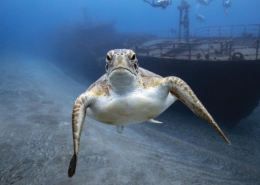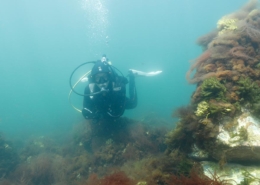Diving Insurance
Do We Really Need It?
The Importance of Dive Insurance. Whether you’re a seasoned diver or an occasional adventurer, ensure your safety and financial security with essential coverage
The Importance of Diving Insurance
Both scuba diving and freediving are exhilarating activities that allow individuals to explore the breathtaking wonders of the underwater world. Whether you are an avid diver or someone who enjoys the occasional dive, it is essential to prioritize your safety and financial protection. The best way to achieve this is by obtaining diving insurance. In this blog, we will delve into the significance of diving insurance and why every diver should consider investing in this crucial coverage.
Safety First:
Diving insurance plays a vital role in ensuring the safety of divers. While scuba diving and freediving are generally safe activities, there are inherent risks involved. Accidents can happen, such as decompression sickness, diving-related injuries, or even equipment malfunctions. Diving insurance provides you with the peace of mind that you will receive immediate assistance and coverage for any medical expenses incurred during a dive-related incident. This safety net allows divers to focus on their underwater adventures without worrying about potential financial burdens.
Medical Coverage:
One of the primary benefits of diving insurance is access to comprehensive medical coverage that is specifically tailored to diving-related injuries. In case of an emergency, divers can face hefty medical expenses, which can add up quickly. Diving insurance typically covers emergency medical treatments, hyperbaric chamber sessions, evacuation costs, and even post-treatment care. These provisions ensure that you receive appropriate medical attention without the added stress of financial implications.
Equipment Protection:
Diving equipment is a significant investment for any diver. Scuba or freediving computers, regulators, buoyancy compensators, weight systems, wetsuits, masks, fins, not to mention all the accessories that you might have, the cost of gear can quickly accumulate. Our DiveAssure diving plans can include coverage for theft, loss, or damage to your diving equipment. This means that if your equipment is stolen, misplaced, or damaged during a dive trip, you can receive compensation or a replacement, saving you from bearing the entire financial burden.
Trip Cancellation and Interruption:
Diving expeditions often involve substantial cost and planning, including travel arrangements, accommodation bookings, and equipment rentals. However, unforeseen circumstances such as natural disasters, illness, or travel restrictions can force you to cancel or cut short your trip. Our DiveAssure travel plans provide coverage for trip cancellation or interruption, reimbursing you for non-refundable expenses or additional costs incurred due to these unexpected events. This coverage allows you to protect your investment and resume your diving adventures when conditions permit.
Liability Protection:
Diving insurance not only safeguards the diver but also extends to cover liability in case of accidents involving third parties. If you inadvertently cause damage to coral reefs, marine life, or other divers during a dive, you may be held responsible for the associated costs. Diving insurance can provide liability coverage, ensuring that you are protected from potential legal and financial consequences.
International Coverage:
For divers who love to explore different dive sites around the world, international diving insurance is particularly valuable. While your regular health insurance might offer coverage within your home country, it may not extend to international destinations. Diving insurance typically includes global coverage, allowing you to enjoy diving adventures in various locations with the assurance of protection, regardless of where you are in the world.
My Travel Insurance offers the same coverage – Doesn’t it?
While some travel insurance policies may offer coverage for certain aspects of diving, it’s important to note that not all travel insurance plans provide comprehensive coverage specifically tailored to diving-related risks and activities. Here are a few points to consider:
- Diving-specific Coverage: Travel insurance policies often have limitations and exclusions when it comes to high-risk activities like scuba diving or freediving. They may have depth restrictions, exclude coverage for certain types of dives (e.g., wreck diving, cave diving), or have limitations on the number of dives covered. Diving insurance, on the other hand, is specifically designed to address the unique risks associated with diving and typically offers more extensive coverage for medical expenses, equipment protection, and liability.
- Equipment Coverage: While travel insurance may cover personal belongings, including some diving equipment, the coverage limits are often lower compared to dedicated diving insurance. Diving insurance provides more comprehensive coverage for theft, loss, or damage to diving equipment, ensuring that you can replace or repair essential gear without significant out-of-pocket expenses.
- Enhanced Medical Coverage: Diving-related injuries can be complex and require specialized medical treatments, such as hyperbaric chamber sessions. Diving insurance typically includes provisions for these specialized treatments, which may not be covered by standard travel insurance. Additionally, diving insurance can offer coverage for as well as assist with emergency evacuations related to diving incidents, ensuring you receive the necessary medical care promptly.
- Expertise and Knowledge: Diving insurance providers often have extensive experience and understanding of the diving industry and its associated risks. They can offer tailored advice, resources, and support in the event of an emergency or claim. Most diving insurance providers also have diving medical professionals available to consult with the local emergency responders to ensure you are getting the correct care, as well as offer a non-emergency medical hotline for queries that divers may have about a possible diving related incident. This specialized knowledge is invaluable when it comes to addressing the unique challenges and requirements of divers.
- Peace of Mind: By obtaining dedicated diving insurance, you can have peace of mind knowing that you have comprehensive coverage specifically designed for the risks and activities involved in diving. It allows you to focus on enjoying your dives without concerns about potential gaps or limitations in your coverage.
While travel insurance can be beneficial for general travel purposes, investing in diving insurance provides an additional layer of protection specifically tailored to the unique risks and requirements of diving. It ensures that you have comprehensive coverage for medical expenses, equipment protection, liability, and other diving-related incidents, allowing you to fully enjoy your diving adventures with confidence.
Who needs to get diving insurance?
Diving insurance is recommended for anyone who engages in scuba diving or freediving of any form. It is particularly important for the following individuals:
- Certified Divers: If you are a diver certified through a recognised agency, whether you dive occasionally or frequently, diving insurance is highly recommended. Certified divers often invest significant time and money in their training and equipment, and having insurance helps protect their investment and provide financial security in case of accidents or emergencies.
- Dive Professionals: Freediving instructors, scuba diving instructors, divemasters, and other dive professionals who work in the diving industry should have diving insurance. These individuals often have greater exposure to risks and liabilities due to their involvement in leading dives, teaching, and supervising divers. Diving insurance can provide liability coverage, protecting them from potential legal and financial consequences in the event of accidents or injuries involving their clients.
- Dive Travelers: If you frequently travel to different dive destinations, diving insurance becomes even more important. Traveling to unfamiliar locations and diving with different operators may increase the level of risk involved. Diving insurance provides peace of mind by ensuring you have comprehensive coverage, including medical expenses, equipment protection, and trip interruption or cancellation, regardless of your location.
- Technical Divers: Technical diving involves more advanced and complex diving techniques, such as deep diving, cave diving, or mixed-gas diving. These activities come with additional risks and often require specialized equipment and training. Diving insurance tailored for technical diving provides coverage specific to the unique risks and requirements of these advanced diving practices.
- Underwater Photographers and Videographers: Divers who engage in underwater photography or videography carry valuable camera equipment with them during dives. Diving insurance can offer coverage for this equipment, protecting it against theft, loss, or damage. Additionally, it provides liability coverage in case of accidents involving other divers or marine life while capturing images or footage underwater.
- Dive Club or Group Members: If you are a member of a dive club or regularly dive with a group, diving insurance can be beneficial. It provides coverage for individual divers within the group, ensuring that all participants are protected in case of accidents or emergencies during group dives.
Remember, even if you have other types of insurance, such as travel insurance or health insurance, they may not provide adequate coverage or high enough limits for diving-related risks and activities. Diving insurance is specifically designed to address the unique needs of divers, offering comprehensive coverage and specialized support in case of diving incidents.
Diving Accident Coverage vs. Diving and Travel Coverage
Diving Accident Coverage and Diving and Travel Coverage are two different types of insurance that provide varying levels of protection for divers. Let’s explore the differences between these two types of coverage:
Diving Accident Coverage:
Diving Accident Coverage, also known as Diving Accident Insurance, is a specific type of insurance that focuses on providing financial protection in the event of a diving-related accident or injury. It typically includes the following key components:
- Medical Expenses: Diving accident coverage offers reimbursement for medical treatments, hospitalization, and related expenses resulting from diving accidents. This coverage is crucial as medical bills for diving-related injuries can be substantial, especially if specialized treatments like hyperbaric chamber sessions are required.
- Emergency Evacuation: Diving accidents may necessitate emergency evacuation to a hyperbaric chamber or medical facility. Diving accident coverage often includes provisions for the cost of emergency evacuation, ensuring that divers receive timely and appropriate medical care.
- Disability and Accidental Death: In the unfortunate event of permanent disability or accidental death resulting from a diving accident, this coverage may provide benefits or compensation to the insured or their beneficiaries.
Diving accident coverage primarily focuses on protecting divers from the financial burden associated with diving-related accidents, injuries, and their immediate aftermath.
Diving and Travel Coverage:
Diving and Travel Coverage, often referred to as Diving Travel Insurance or Diving Vacation Insurance, is a broader type of insurance that encompasses both travel-related benefits and diving-specific coverage. It typically includes the following elements:
- Trip Cancellation and Interruption: Diving and travel coverage provides reimbursement for non-refundable expenses or additional costs incurred due to trip cancellation or interruption, such as unforeseen illness, travel restrictions, or natural disasters.
- Travel Medical Coverage: This component offers medical coverage for general travel-related incidents and emergencies that may occur during your trip, not just diving-related injuries. It may include coverage for medical treatments, hospital stays, emergency medical evacuations, and repatriation.
- Diving-specific Coverage: Diving and travel coverage often includes some level of coverage for diving-related activities. However, the extent of this coverage may vary. It can include medical expenses resulting from diving accidents, equipment protection, and even liability coverage for damages caused by the insured diver.
Diving and travel coverage provides a more comprehensive package that combines travel-related benefits and some level of diving-specific coverage. It is suitable for divers who want a broader scope of protection, including coverage for non-diving-related incidents during their trips.
Note: It’s important to carefully review the terms and coverage details of both types of insurance to understand their specific inclusions, exclusions, limits, and conditions. Consider your individual diving needs, travel plans, and desired level of protection to determine which type of coverage best suits your requirements.
Why DiveAssure
DiveAssure is a well-established and reputable provider of diving insurance that offers comprehensive coverage and a range of benefits tailored specifically for divers. Here are some reasons why divers choose DiveAssure:
- Diving-Specific Expertise: DiveAssure was founded by divers and specializes in diving insurance, with a deep understanding of the unique risks and requirements of the diving community. They have extensive knowledge and experience in the diving industry, ensuring that their coverage is specifically designed to address the needs of divers.
- Comprehensive Coverage: DiveAssure provides a wide range of coverage, including coverage for medical expenses, emergency evacuation, equipment protection, trip interruption or cancellation, and even liability coverage. Their insurance plans are designed to offer comprehensive protection for divers, both in and out of the water.
- Global Coverage: DiveAssure offers international coverage, ensuring that you are protected wherever your diving adventures take you. This is particularly important for divers who travel to different dive destinations around the world, as coverage from other insurance providers may have limitations or exclusions outside of your home country.
- Flexible Plans: DiveAssure offers a variety of insurance plans to cater to different diving needs and budgets. Whether you are an occasional recreational diver, a frequent traveler, or a professional in the diving industry, DiveAssure provides options that can be tailored to your specific requirements.
- Immediate Assistance: DiveAssure operates a 24/7 emergency hotline that connects you to their global network of diving emergency specialists. In the event of a diving incident or emergency, you can receive immediate assistance and guidance from experienced professionals who understand the unique challenges of diving-related situations.
- Reputation and Trust: DiveAssure has been serving the diving community for many years and has built a strong reputation for their reliable and responsive service. Their commitment to customer satisfaction and their track record of handling claims efficiently have earned them the trust of divers around the world.
- Additional Benefits: In addition to insurance coverage, DiveAssure provides additional benefits to its members, such as access to discounts on dive-related products and services.
When choosing DiveAssure or any other insurance provider, it is important to carefully review the policy terms, coverage limits, exclusions, and conditions to ensure they align with your specific needs. It is also advisable to compare multiple insurance providers to find the best fit for your diving requirements and budget. This will probably lead you right back to DiveAssure – but well informed.
Conclusion:
Diving insurance is a crucial investment that protects both your financial well-being and safety. With its wide-ranging coverage, including medical expenses, equipment protection, trip cancellation, liability coverage, and international assistance, diving insurance provides divers with peace of mind and allows them to fully immerse themselves in their underwater experiences. As a responsible diver, prioritize your safety and protect your passion for diving by obtaining comprehensive diving insurance. Remember, it’s better to be safe and prepared rather than facing unexpected financial and health challenges during your diving adventures.















Plaats een reactie
Deelnemen aan de discussie?Voel je vrij om een bijdrage te leveren!